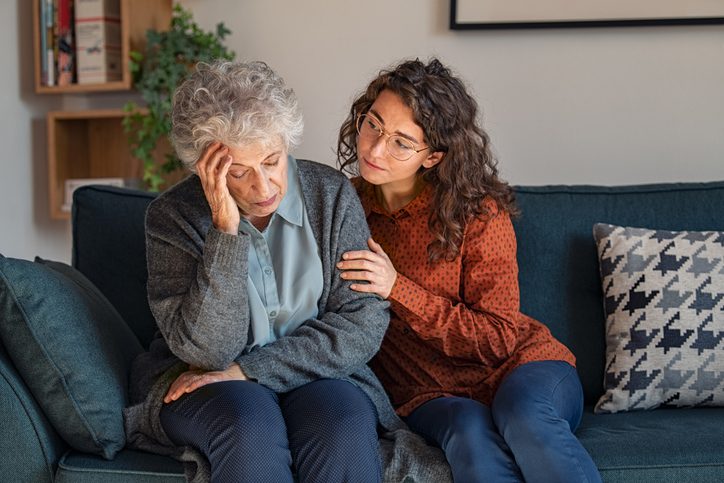Caring for an older loved one is a journey filled with love, patience, and compassion. But sometimes, changes in their behavior or mood can leave you feeling concerned. Aging comes with its own set of mental health challenges, and anxiety is one of the most common—and often overlooked—issues seniors face. If you’ve noticed a shift in your loved one’s demeanor, it might be time to explore whether anxiety is at play and how you can support them in finding relief.
Anxiety in seniors can look different than it does in younger people. While nervousness or worry might be the most obvious signs in others, older adults may display symptoms in more subtle or unexpected ways:
- Increased irritability or agitation: Your loved one may become easily frustrated or upset by things that previously didn’t bother them.
- Restlessness and pacing: They may have difficulty sitting still or constantly seem “on edge.”
- Physical complaints: Headaches, stomach issues, or other aches and pains without a clear medical cause can sometimes be linked to anxiety.
- Avoidance of social interactions: Isolation or withdrawal from family and friends can signal underlying anxiety or fear.
- Sleep disturbances: Your aging loved one may have sleep disturbances such as trouble falling asleep or staying asleep. This may indicate that their mind is preoccupied with worry.
- Memory issues or confusion: Anxiety can sometimes mimic cognitive decline, causing forgetfulness or difficulty focusing.
- Frequent worrying: They may express concerns about health, finances, or other aspects of life more often than usual.
It’s easy to attribute some of these symptoms to the natural aging process or other medical conditions. However, anxiety is not a normal part of aging and should be addressed like any other health concern. The emotional toll of losing loved ones, facing physical decline, or grappling with independence can contribute to anxiety—but help is available.
Treatment Options for Seniors with Anxiety
The good news is that anxiety can be effectively managed, even in later life. A combination of therapeutic approaches and compassionate care can make a significant difference. Some treatment options may include:
- Therapy: One-on-one sessions with a therapist can help your loved one explore their fears and develop coping strategies. Additionally, including family members in therapy can strengthen support networks and improve communication. Group sessions offer the chance to connect with others facing similar challenges, reducing feelings of isolation.
- Medication: In some cases, medications like anti-anxiety drugs or antidepressants may be recommended. It’s important to work with a healthcare provider who understands the unique needs of seniors to find the safest and most effective treatment.
- Lifestyle changes: Gentle activities like walking, yoga, or tai chi can help reduce anxiety and boost overall well-being. Eating a balanced diet can positively impact mood and energy levels.
- Relaxation techniques: Mindfulness, deep breathing exercises, and progressive muscle relaxation can calm an anxious mind.
- Support from specialized care: Sometimes, specialized care designed specifically for seniors is necessary. Inpatient programs that provide 24-hour nursing care, social work, and therapeutic services can help seniors manage anxiety.
How Peak Behavioral Health Can Help
At Peak Behavioral Health in Santa Teresa, New Mexico, we understand the unique challenges seniors face. Our senior program is tailored to meet the emotional and psychological needs of older adults with compassion and respect. We offer:
- 24-hour compassionate nursing care: Your loved one will receive round-the-clock support from a dedicated team of professionals.
- Therapeutic services: We offer individual, family, and group therapy sessions to help seniors work through their anxiety and other mental health concerns.
- Discharge planning with family involvement: From the moment your loved one is admitted, we work with you to create a discharge plan that ensures continuity of care and ongoing support.
- Specialized support for cognitive issues: Many seniors in our program experience confusion and memory loss. Our team approaches these challenges with sensitivity, creating a safe and nurturing environment.
What to Do If Your Loved One Refuses Help
It can be heartbreaking if your loved one is reluctant to seek mental health treatment. Here are some ways to encourage them:
- Listen with empathy: Let them express their fears and concerns without judgment.
- Share information: Gently provide details about anxiety and how treatment can improve their quality of life.
- Involve trusted figures: Sometimes hearing advice from a doctor, religious leader, or close friend can make a difference.
- Be patient: Change takes time. Continue offering support and reminding them that help is available when they’re ready.
How You Can Support Your Loved One’s Recovery
Being a source of comfort and stability can make a world of difference. Let your loved one know they can talk to you about their feelings without fear of judgment. Create a calm environment at home and help them establish a peaceful space where they can relax and unwind.
It is important to stay involved in your senior’s care. Attend therapy sessions, if appropriate, and be an active part of their recovery journey. Don’t forget to celebrate their progress. Acknowledge small victories and encourage your loved one to take pride in their efforts.





